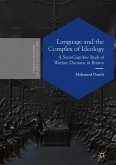This book undertakes a systematic analysis of the workings of ideology in discourse, using an interdisciplinary approach that links language, cognition and society. Through examination of two corpora - a collection of British newspaper articles and a set of political speeches - the author examines Britain's involvement in the Iraq War (2003), and critically assesses the language practices which constructed a pro-war ideology under Tony Blair's premiership. Drawing on a constellation of concepts from van Dijk's socio-cognitive model, this book carries out both qualitative and quantitative analyses and conceptualises discourse as a nonlinear, highly discursive and socio-cognitive phenomenon. This innovative work will appeal to students and scholars of Cognitive Linguistics, Quantitative Linguistics, Social Constructivism, Critical Discourse Analysis, Political Sciences and Communication Studies.
Bitte wählen Sie Ihr Anliegen aus.
Rechnungen
Retourenschein anfordern
Bestellstatus
Storno








